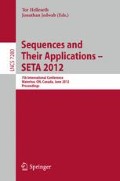Abstract
Scheduling access to a shared channel in mobile ad hoc networks must address numerous competing requirements, for example on throughput, delay, and fairness. It must address disparate and dynamic traffic demands as well as losses due to collisions with neighbouring transmitters. It must address changes in the topology of the network that arise from mobility. Topology transparent scheduling schemes have been proposed as a means to support reasonable delay guarantees, minimum throughput guarantees, and to a lesser extent fairness concerns. Sequences based on codes and combinatorial designs have been explored that support topology transparent scheduling for mobile ad hoc networks. However, all of the schemes proposed provide every node with the same (or essentially the same) channel access, by assigning each node a transmission frame in which the number of transmission slots (‘weight’) is the same. In order to mitigate effects of losses due to collision, it is important to limit the set of frame schedules that are permitted; but at the same time, using frames with differing weights can improve throughput without sacrificing fairness. Combinatorial requirements for variable weight frame schedules are determined based on these observations.
Access this chapter
Tax calculation will be finalised at checkout
Purchases are for personal use only
Preview
Unable to display preview. Download preview PDF.
References
Awduche, D.O., Ganz, A.: MAC protocol for wireless networks in tactical environments. In: Proc. Military Communications Conference 1996 (MILCOM 1996), pp. 923–927 (1996)
Chlamtac, I., Faragó, A.: Making transmission schedules immune to topology changes in multi-hop packet radio networks. IEEE/ACM Transactions on Networking 2(1), 23–29 (1994)
Chu, W., Colbourn, C.J., Syrotiuk, V.R.: The effects of synchronization on topology-transparent scheduling. Wireless Networks 12(6), 681–690 (2006)
Chu, W., Colbourn, C.J., Syrotiuk, V.R.: Slot synchronized topology-transparent scheduling for sensor networks. Computer Communications 29(4), 421–428 (2006)
Chung, F.R.K., Salehi, J.A., Wei, V.K.: Optical orthogonal codes: design, analysis and applications. IEEE Transactions on Information Theory 35(3), 595–604 (1989)
Colbourn, C.J., Ling, A.C.H., Syrotiuk, V.R.: Cover-free families and topology-transparent scheduling for MANETs. Designs, Codes, and Cryptography 32(1-3), 35–65 (2004)
Colbourn, C.J., Syrotiuk, V.R.: Scheduled persistence for medium access control in sensor networks. In: Proc. First IEEE International Conference on Mobile Ad-hoc and Sensor Systems (MASS 2004), pp. 264–273 (2004)
Colbourn, C.J., Syrotiuk, V.R., Ling, A.C.H.: Steiner Systems for Topology-Transparent Access Control in MANETs. In: Pierre, S., Barbeau, M., An, H.-C. (eds.) ADHOC-NOW 2003. LNCS, vol. 2865, pp. 247–258. Springer, Heidelberg (2003)
Du, D.-Z., Hwang, F.K.: Combinatorial Group Testing and Its Applications, 2nd edn. Series on Applied Mathematics, vol. 12. World Scientific (2000)
D’yachkov, A., Rykov, V., Rashad, A.M.: Superimposed distance codes. Problems Control and Information Theory 18, 237–250 (1989)
Füredi, Z., Ruszinkó, M.: Superimposed codes are almost big distance ones. In: Proc. IEEE Int. Symp. Inform. Theory (ISIT), p. 118 (1997)
Jiang, J., Wu, D., Fan, P.: General constructions of optimal variable-weight optical orthogonal codes. IEEE Trans. Inform. Theory 57(7), 4488–4496 (2011)
Ju, J.-H., Li, V.O.K.: An optimal topology-transparent scheduling method in multihop packet radio networks. IEEE/ACM Transactions on Networking 6(3), 298–306 (1998)
Ju, J.-H., Li, V.O.K.: TDMA scheduling design of multihop packet radio networks based on latin squares. IEEE Journal on Selected Areas in Communications 17(8), 1345–1352 (1999)
Lutz, J., Colbourn, C.J., Syrotiuk, V.R.: Apples and oranges: Comparing schedule- and contention-based medium access control. In: Proceedings of the 13th ACM International Conference on Modeling, Analysis and Simulation of Wireless and Mobile Systems (MSWiM 2010), Bodrum, Turkey, pp. 319–326 (October 2010)
Lutz, J., Colbourn, C.J., Syrotiuk, V.R.: Topological persistences for medium access control (submitted, 2012)
Pióro, M., Medhi, D.: Routing, Flow, and Capacity Design in Communication and Computer Networks. Elsevier Inc. (2004)
Rentel, C.H., Kunz, T.: Reed-Solomon and Hermitian Code-Based Scheduling Protocols for Wireless Ad Hoc Networks. In: Syrotiuk, V.R., Chávez, E. (eds.) ADHOC-NOW 2005. LNCS, vol. 3738, pp. 221–234. Springer, Heidelberg (2005)
Syrotiuk, V.R., Colbourn, C.J., Ling, A.C.H.: Topology-transparent scheduling in MANETs using orthogonal arrays. In: Proceedings of the DIAL-M/POMC Joint Workshop on Foundations of Mobile Computing, pp. 43–49. ACM, San Diego (2003)
Syrotiuk, V.R., Colbourn, C.J., Yellamraju, S.: Rateless forward error correction for topology-transparent scheduling. IEEE/ACM Transactions on Networking 16(2), 464–472 (2008)
Wu, D., Cao, J., Fan, P.: New Optimal Variable-Weight Optical Orthogonal Codes. In: Carlet, C., Pott, A. (eds.) SETA 2010. LNCS, vol. 6338, pp. 102–112. Springer, Heidelberg (2010)
Xu, C.: An algorithm for improving throughput guarantee of topology-transparent MAC scheduling strategy. Wireless Sensor Network 2, 801–806 (2010)
Yang, G.-C.: Variable-weight optical orthogonal codes for CDMA networks with multiple performance requirements. IEEE Trans. Commun. 44, 47–55 (1996)
Zhao, H., Wu, D., Fan, P.: Constructions of optimal variable-weight optical orthogonal codes. Journal of Combinatorial Designs 18, 274–291 (2010)
Zheng, R., Hou, C.-J., Sha, L.: Asynchronous wakeup for ad hoc networks. In: Proceedings of the International Conference on Mobile Ad Hoc Networking and Computing (Mobihoc 2003), pp. 35–45 (2003)
Author information
Authors and Affiliations
Editor information
Editors and Affiliations
Rights and permissions
Copyright information
© 2012 Springer-Verlag Berlin Heidelberg
About this paper
Cite this paper
Lutz, J., Colbourn, C.J., Syrotiuk, V.R. (2012). Variable Weight Sequences for Adaptive Scheduled Access in MANETs. In: Helleseth, T., Jedwab, J. (eds) Sequences and Their Applications – SETA 2012. SETA 2012. Lecture Notes in Computer Science, vol 7280. Springer, Berlin, Heidelberg. https://doi.org/10.1007/978-3-642-30615-0_5
Download citation
DOI: https://doi.org/10.1007/978-3-642-30615-0_5
Publisher Name: Springer, Berlin, Heidelberg
Print ISBN: 978-3-642-30614-3
Online ISBN: 978-3-642-30615-0
eBook Packages: Computer ScienceComputer Science (R0)

